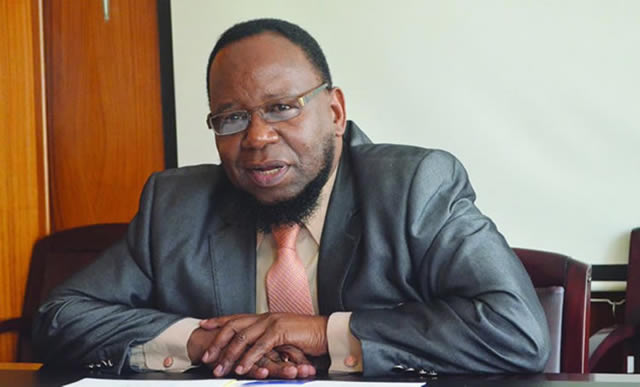Dokora extends right hand of fellowship

Stanely Mushava : Features Correspondent
Reform is ringing as Primary and Secondary Education Minister Dr Lazarus Dokora sets forth the initial phases of the new curriculum. Minister Dokora has come across as a perpetual revolutionary for entering into force a series of reforms in recent months, but there is a reference point behind the changes. The ministry is implementing the Curriculum Framework for Primary and Secondary Education over the next seven years, with a view of making education equal to the challenges of a globalised century. The framework presents new learning areas and cross-cutting themes set to meet the dual design of building accomplished citizens while driving national development in the increasingly competitive global context.
And now, as the revolution takes shape in earnest, Minister Dokora is extending the hand of fellowship to education development partners whom he says must align their contributions with the needs of the new curriculum.
This week, the Ministry of Primary and Secondary Education convened a stakeholders’ meeting in Harare under the theme: “New Curriculum: Collaborative Engagement with Stakeholders for Quality Education.”
Various arms of the ministry met representatives from a cross-section of stakeholders including development partners, tertiary institutions, children’s organisations, para-church ministries, publishers, booksellers and technoprenuers to map new collaboration terms.
The ministry articulated the new curriculum and stakeholders deliberated on how they can contribute meaningfully to the new dispensation.
Primary and Education Ministry permanent secretary Dr Sylvia Utete-Masango said collaboration was requisite for the success of the new curriculum.
“As can be appreciated, the Ministry of Primary and Secondary Education endeavours to engage stakeholders at every stage the implementation of the new curriculum,” Dr Utete-Masango said.
“In 2015, the ministry embarked on a mapping exercise to identify stakeholders and came up with 392 partners, 126 of whom have memoranda of understanding with the ministry at national level, 58 at provincial level, 72 at district level and the rest at school level,” she said.
Dr Utete-Masango said the partnerships in areas such as health and child care, fees, non-formal education, infrastructure, climate change, income generation, child rights, inclusion, counselling and guidance, psycho-motor and religion were needed for the ministry to meet its set objectives. She said the diverse backgrounds and expertise of the stakeholders must be strategically realigned in the dispensation of the new curriculum.
“Zimbabwe has an obligation to provide citizens with quality education that will transform their lives. It behoves the Ministry of Primary and Secondary Education and stakeholders to create the enabling conditions for this kind of education,” Dr Utete-Masango said.
Teacher capacity development has come out as an area of emphasis. The ministry has tasked universities to train teachers in line with the curriculum framework.
Bindura University of Science Education is training teachers in science and technology; Great Zimbabwe University, languages and early childhood development (ECD); University of Zimbabwe, infrastructure development, technical and vocational education; Zimbabwe Open University, ECD and teacher education; Midlands State University, teacher education and information and communication technology (ICT); and Lupane State University, teacher education and agriculture.
Minister Lazarus Dokora said the changes his ministry had lined up were widely consulted despite the scathing criticism which has been levelled against him on social media for allegedly coming up with overnight decisions.
“There were spaces for consultation during the curriculum review process. Schools and community halls were opened up for consultation. We also received written material and Whatsapp messages,” Minister Dokora said.
“There were two contending tendencies during the consultative process. One group asked: ‘Why change things that are good?’ The other group said: ‘We need to be relevant; we need skills.’
“‘What are these children going to do after graduating with 10 As? Is it enough for them to graduate into selling airtime, with literacy for typing on Whatsapp?’ The consultative process provoked an interesting debate about reform, skills and relevance,” Minister Dokora added.
The ministry developed a draft document for further review, incorporating contributions by the different populations. The resulting curriculum process was ratified by Parliament on September 22 last year and launched the following month.
Minister Dokora said even at the current stage, it was necessary to bring everyone to the forum to tap the best of every world for the enrichment of the education sector.
“Government calls for a joint acquisition for resources for teacher capacity development, research, ICT and infrastructure development. Teachers’ posts are not under threat. Every teacher is necessary but they have to embrace the new methods,” Minister Dokora said.
The minister insists that the process underway is making a new curriculum instead of making an old curriculum new.
“Publishers are already at work in the development of new learning materials. We do not desire to get sugarcoated material. Publishers cannot take a book that was being used before, change the cover and call it new. We are not going to transform on old classics,” Minister Dokora said.
Publishers and booksellers in attendance, including ZPH Publishers, College Press, Heritage Publishing House, Consultus Publishing Services, Wesi Booksellers, Mazvitapa Publishers, Oxford University Press and Priority Project Publishers, pledged to develop and distribute fresh content set to the needs of the new curriculum.
They also called for piracy audits in schools, resumption of regular meetings with the ministry, mobilisation of funding, partnerships for the development of new materials and a budget allocation for the purchase of books from Treasury in order to incentivise the book value chain.
During the roundtable deliberations, ICT companies also pledged to help make the ministry’s database and websites functional and up to the minute, develop and deploy new content and e-learning packages, improve the financial management systems, create educational applications and procure technological infrastructure.
“We also need to collaborate with partners in the area of infrastructure development. We have mission schools and company schools in the country. We need their infrastructure to expand and accommodate the growing population,” he said.
“I am also going to engage the Chinese more aggressively so that while they are doing other things in the country, they can be investing in our education, building schools for us,” he added.
The minister said development partners had to enter into schools through the designated channels in order to forestall confusion. He made reference to recent reports about mandatory HIV testing in schools without his ministry being privy to the programme.
“The curriculum framework will transform education in tandem with Zim-Asset. We need to develop a participatory citizenship, equip students for leadership and set the basis for peace and co-existence,” Minister Dokora said.
The ministry has projected critical thinking, problem solving, leadership, communication skills, technological aptitude, financial literacy, media literacy, patriotism and engagement with national symbols as exit profiles under the new curriculum. Minister Dokora, however, lamented that non-formal education, a new emphasis point in the new curriculum, was still a huge challenge.
“I was meeting 166 school heads recently and inquired into progress made in the area of non-formal education. Only two out of the 166 heads had applied to be considered as open centres for non-formal education,” he minister.
The minister lamented that old habits are dying hard as not everyone in the sector was excited about the changes but said everyone would catch on in time.
The ministry has also put in place the Centre for Research, Innovation and Development which Minister Dokora said would be the fulcrum to revolve around for a long time. At present, the centre has the capacity for 215 researchers.
In an apparent response to the Ministry of Higher Education’s Science, Technology, Engineering and Mathematics (STEM) drive, the Ministry of Primary and Secondary Education has dropped a new sound bite called Science, Technology, Engineering, Art and Mathematics (STEAM), arguing that “half is not enough.”
Arts education, encompassing expressive arts and humanities, will be an integral part of the new curriculum with new subjects like visual and performing arts where students will grapple with genres such as painting, music, dance and theatre from Early Childhood Development (ECD) upwards.
“Dominic Benhura is known worldwide and has done the country proud as a sculptor but no school is teaching sculpture. The natural intelligence of our people took them to the world stage,” Minister Dokora said.
“Musicians like Tocky Vibes never ascribe their careers to teachers. They only mention their mothers. In the absence of formal training, mothers are the ones giving us the likes of Tocky Vibes. Chipawo (Children’s Performing Arts Workshop) operates as an NGO, a misfit in the system operating on the periphery,” he said.
The minister also lamented failure by schools to take seriously their mandate to nurture sporting talent.
“School heads are the first to complain about Zimbabwe not winning trophies. They are quick to blame poverty when they are the ones using the Physical Education slot to revise Maths,” he said.
Family Values, Religious and Moral Education is also a new (or rather newly updated) subject under the new curriculum.
“It is fundamental that we restore family values. ‘What constitutes family? Is there such a thing as extended family?’ Young people live with those nearest to them and education calls them strangers,” Minister Dokora said.
“We need a paradigm shift to relocate ourselves in our own space. Haralambos, now going into the 40th edition, is busy still perpetuating these things. We need locally developed content to speak to local values even if that will take time,” the minister said.
Family, religious and moral educators, including Scripture Union, pledged to help in teacher capacity development by encouraging ethics, and to create leadership training programmes to encourage integrity and team-building skills.
They also offered to develop sexual and reproductive health modules, HIV/AIDS awareness programmes and guidance and counselling.
Acting director of Primary and Secondary Education Mr Peter Muzavazi called for strategic alignment of efforts by all different stakeholders, resolution of discord and clarity of objectives.
“Going forward, there is no them and us but collaboration, not for its sake but to ensure that quality education objectives are achieved. Inclusive education for socio-economic transformation,” Mr Muzavazi said.
“There is need to identify areas of collaboration between the Ministry of Education and stakeholders within the new curriculum, so that resources are mobilised efficiently. We are mapping out the magnitude of collaborative efforts, sharing modalities for collaborations and creating understanding for effective synergies,” he said.











Comments